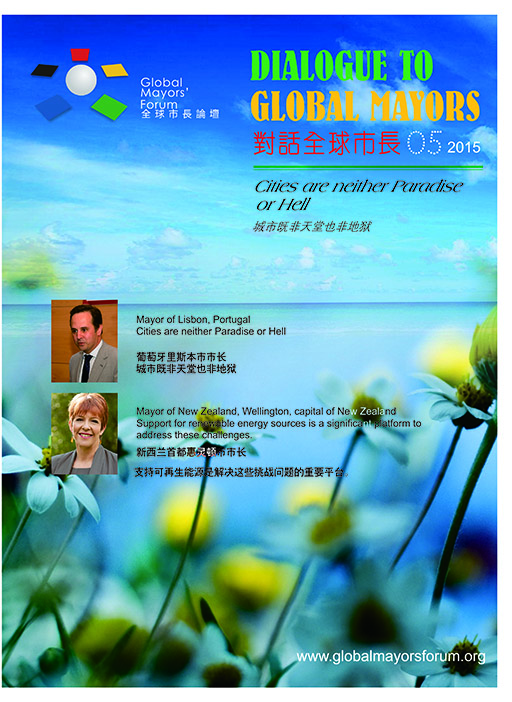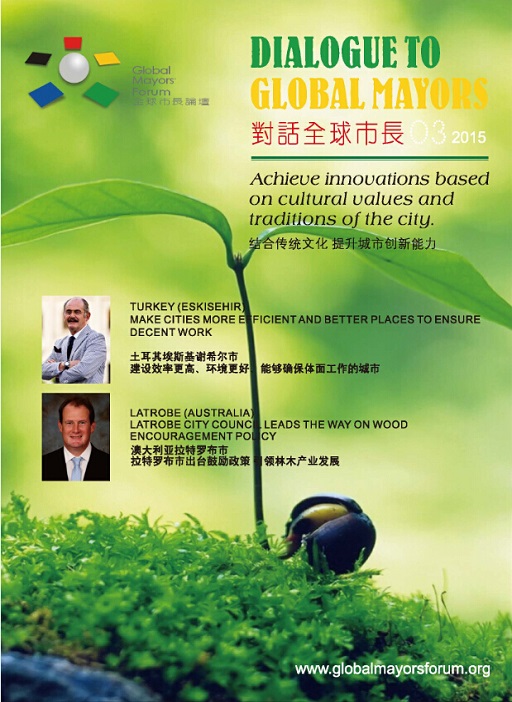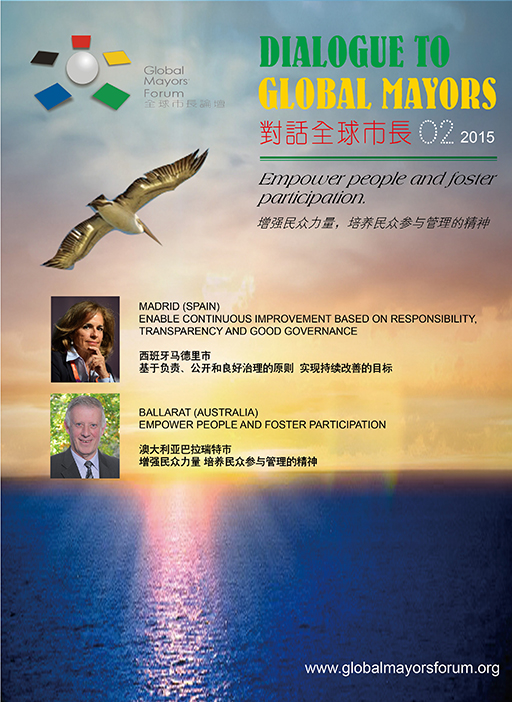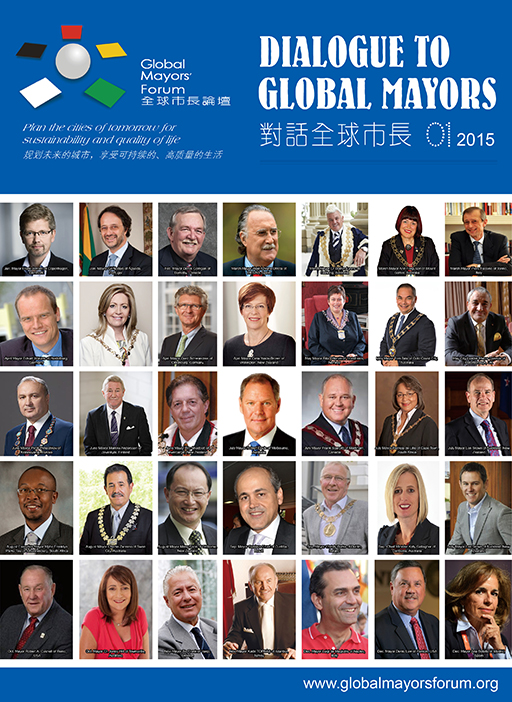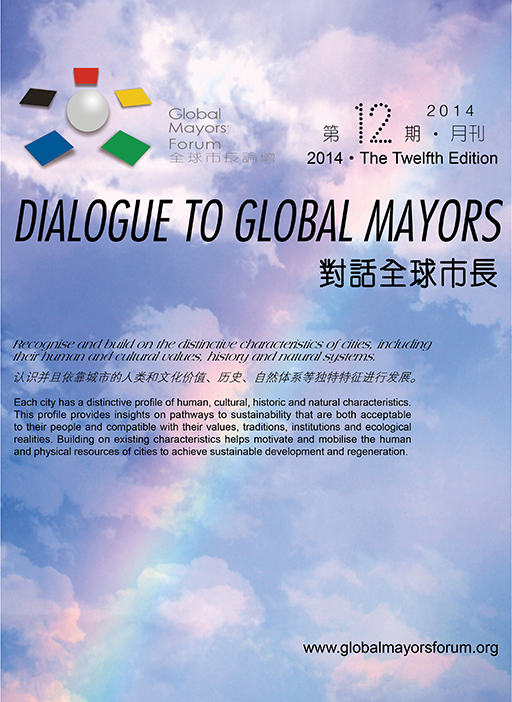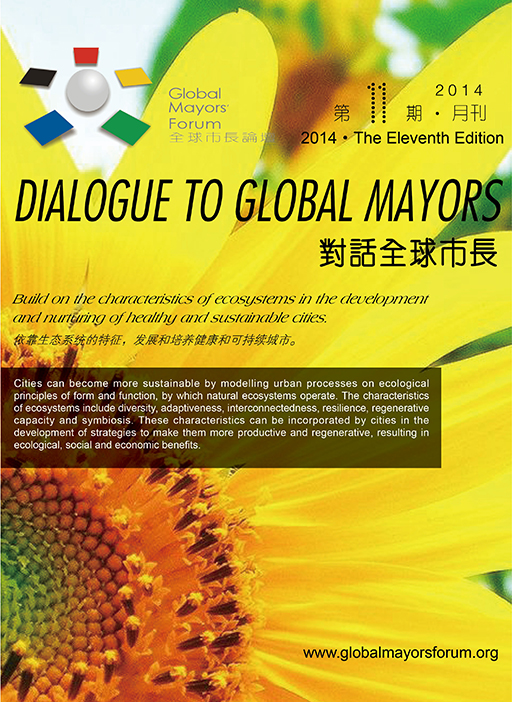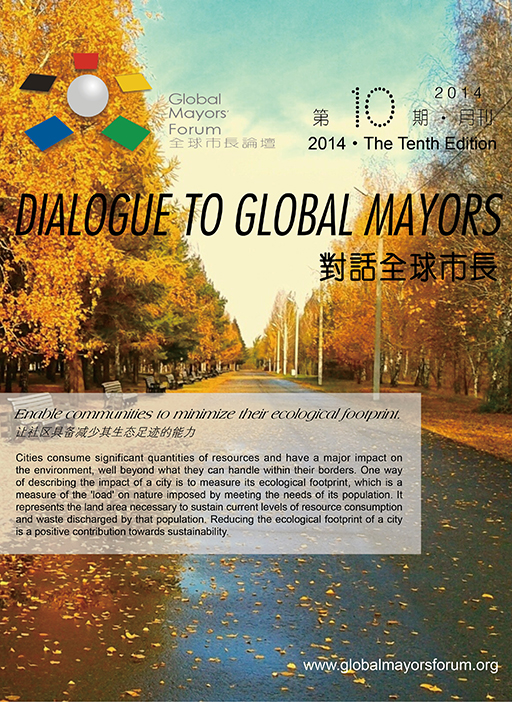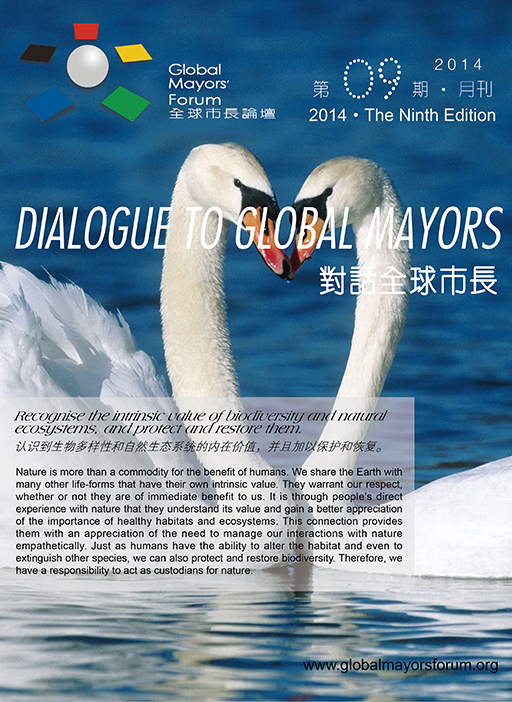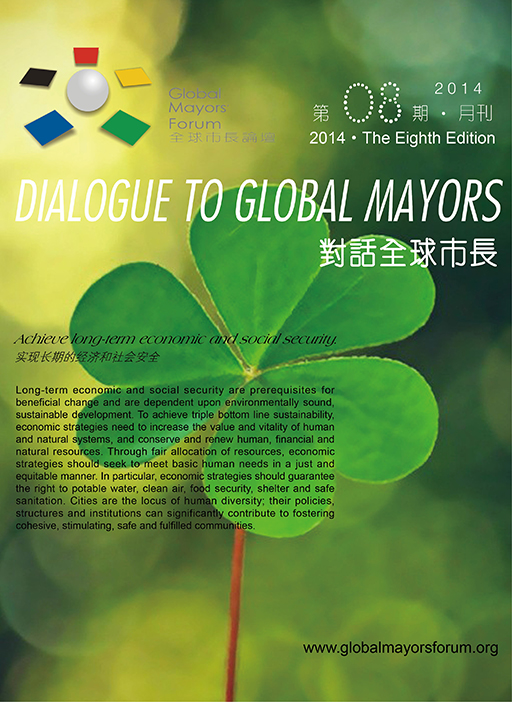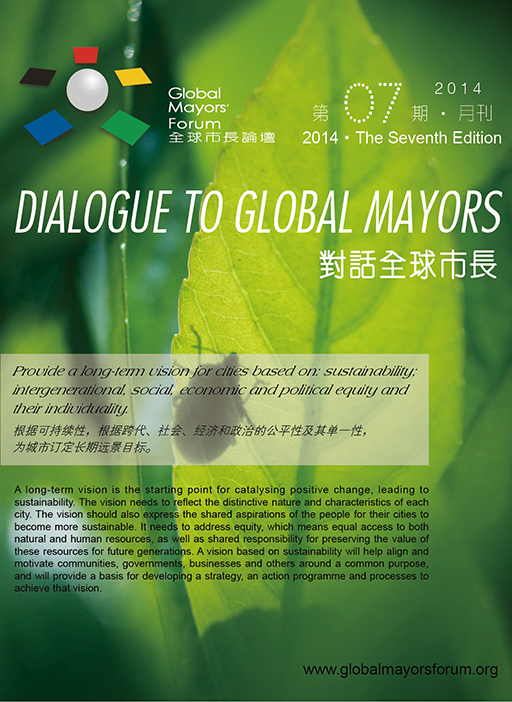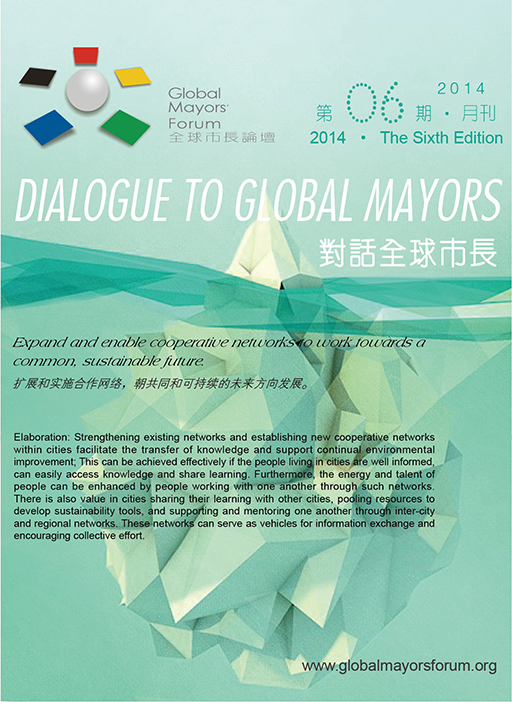Dialogue to Global Mayors
"Dialogue to Global Mayors" 2015 issue#05
“The Earth is not cold and hot unevenly”! This means that the air in Paris is no longer transparent, Beijing’s sky is no longer blue. With the development of global economy, the increasing emissions towards soil, water, especially emissions of harmful substances in the atmosphere, have destroyed the atmospheric environment and the ecosystem and it will eventually cause catastrophic climate changes. Corresponding to the water-pollution, solid pollution and e-waste management has increasingly become the priority of our lonely planet. Therefore, pollution control and human survival environment protection has become a global problem to be solved. In order to control the pollution, sources of the pollution must be identified. It normally comes from fossil energy and non-renewable mineral resources. People should focus on comprehensive development of solar energy, wind, ocean energy and biomass energy. Accelerating the development of global renewable energy would become an increasingly important, urgent, and viable options of global energy structure and adjustment strategy. Pollution control and renewable energy development is the fundamental in all human existence. We must focus on the energy of the city development planning, treatment of city waste, the treatment systems of urban water supply and sewage and experience in developing clean energy.
"Dialogue to Global Mayors" 2015 issue#04
Welcoming this beautiful May makes me think of a line from Spring Travels, a poem by Wang Ya of the Tang Dynasty: “Apricot trees and riverside, the newly opened night wind”. Driving by the Miju River or walking with our friends along Cihu Lake, we can see that spring is adorning the Erhu Lake like poetry and painting. We feel the vitality of the harmony between humans and nature from each city. This is helping us focus on how to build a more inclusive city, building a home which that is pro-poor, inclusive, equitable, and rejects gender, race or other kinds of discrimination. Socially equitable development is one of the three pillars of sustainability, and is vital to creating a shared, sustainable urban future. The challenges posed by the pace and scale of contemporary urbanization require us to invest in infrastructure, development, and political processes that promote inclusivity, and a pro-poor, gender, and youth sensitive agenda.
"Dialogue to Global Mayors" 2015 issue#03
In March, the winter season has already gone and dead leaves fall away as new buds show a flourishing lease on life and renewed vigor. In China, the old saying goes: A Year’s Plan Starts from the Spring Season. So it seems like it is a perfectly natural phenomenon to discuss the theme of urban traditions and innovations in the first of the four seasons, in the same way that a new form of life develops by taking nourishment from old things. Urban innovations include technological advances and other improvements in economic systems, public governance, urban design or cultural identity in the context of sustainability. Changing and re-building the variety of culturally significant traditions creates more economic opportunities, makes cities even more productive, infuses rich cultural and spiritual values with fresh and creative new formats, and accordingly upgrades urban competitive power. That is the topic of this issue of DIALOGUE TO GLOBAL MAYORS: achieve innovations based on the cultural values and traditions of the city.
"Dialogue to Global Mayors" 2015 issue#02
With the coming of February, the northern hemisphere enters spring. It is the time for us to welcome the most important holiday season in China- the Spring Festival. Every nation on earth has such a significant day for their-own festival, people relax, stay at home with their families and join in festival activities with happiness. Thanks to public support and engagement, a variety of culturally significant traditions have been kept alive to the present day. In the same way, the journey towards sustainability and environmental awareness is inseparable from public participation and requires broad based support. That is the topic of this issue of Dialogue to Global Mayors, the seventh Melbourne Principle -- empower people and foster participation. Overcoming urban challenges does not only require new public policies, but the engagement of all city residents since they are the ones experiencing these problems every day and have ideas about how to address them. All citizens are a part of the city. The actions of individuals contribute to improve our cities and change our urban future.
"Dialogue to Global Mayors" 2015 issue#01
2015 is just one-year time left before the Third United Nations Conference on Housing and Sustainable Urban Development (Habitat III), to be hold in 2016. As a member of the WUC Steering Committee, GMF would strive to join in the effort to support Habitat III, revisiting today’s global crisis and seeking for the best solutions to a sustainable urban future. From 2015, the magazine will focus on the topics raised by Habitat III, as our January issue features ‘urban planning for sustainable and high-quality life’. We anticipate that in the year of 2015 there will be more urban policy-makers, stakeholders and experts joining us to contribute more excellent articles for DIALOGUE TO GLOBAL MAYORS. Readers who care about urban development are also welcome to contribute articles to the OPEN DIALOGUE, to create a blueprint for cities of tomorrow.
"Dialogue to Global Mayors" 2014 issue#12
Globalization is a hallmark of our times. It leads to new openings and close connections but also runs the risk of increasing uniformity. In fact, each city has distinctive human, cultural, historic and natural characteristics. All these aspects are important for a city to develop their appeal and provide insights to pathways to sustainability that are both acceptable to their people and compatible with their values, traditions, institutions and ecological realities. Building on existing characteristics helps motivate and mobilize the human and physical resources of cities to achieve sustainable development and regeneration, is the philosophy that the sixth Melbourne principle communicates and is featured in this issue of Dialogue to Global Mayors. The year draws to a close, but our perseverance for the cause of sustainable development will never be stopped. We will spare no efforts to be the communicator of urban cultures and facilitate the sustainable development of cities.
"Dialogue to Global Mayors" 2014 issue#11
With the coming of November, the northern hemisphere enters winter and animals start to hibernate. For human beings, it is the time to harvest fruits and reflect on the past year. Our team at Dialogue to Global Mayors are making a new plan for the next year. We are thankful to all the mayors, network partners and contributors who are the real constructors of this e-magazine. We are looking forward to having your participation in making the e-magazine more colorful, vibrant and reputable in the next year. If human society rises and falls with the cycle of natural ecosystems, it is useful to apply the principles of ecosystems to the strategies of urban development when it comes to sustainability. The 11th issue of "Dialogue to Global Mayors”, we abide by the fifth of Melbourne’s Ten Principles, “Build on the characteristics of ecosystems in the development and nurturing of healthy and sustainable cities”, aiming to show the readers how to model urban processes on ecological principles and operate according to natural ecosystems...
"Dialogue to Global Mayors" 2014 issue#10
October in Shenzhen, a subtropical city around 22 degrees North latitude, brings fair weather and autumn wind, which means the best time to take part in outdoor sports. Supported by UN-HABITAT, and held by the World Urban Campaign(WUC), which was launched by Secretary-General Ban Ki-moon at the Rio+20 Summit in 2012, in partnership with the International Mayor Communication Centre(IMCC), the permanent secretariat of Global Mayors Forum(GMF), “Zero Carbon Trips by Bike” is one of the first activities of the WUC in China. It will start in Shenzhen, and expand first to other Chinese cities, then in Asian and global cities. Through this activity, the secretariat of GMF hope that every citizen will be aware of changing their unsustainable actions and lifestyles, improving ecosystems of urban space and participating in reducing the ecological footprint of cities. The 10th issue of "Dialogue to Global Mayors”, we abide by the fourth of Melbourne’s Ten Principles, “Enable communities to minimise their ecological footprint”, aiming to show the readers...
"Dialogue to Global Mayors" 2014 issue#09
World leaders met on 23rd September to draw a map of the future at the 2014 Climate Summit and are facing the challenges of climate change together. After experiencing a hot summer caused by global climate change, we are now enjoying the cool autumn in September. The 9th issue of "Dialogue to Global Mayors”, we abide by the third of Melbourne’s Ten Principles, “Recognise the intrinsic value of bio-diversity and natural ecosystems, and protect and restore them”, aiming to show the readers how to recognise the intrinsic value of biodiversity and protect our motherland through efforts for sustainable development. We called for papers on the theme of protecting biodiversity through our global network of mayors and specialists, and received an overwhelming response from China and overseas.
"Dialogue to Global Mayors" 2014 issue#08
The UNEP launched "Principles for Building a Green, Fair and Inclusive Economy” in 2008 which is a permanent strategy to solve the issues of economic security and the safe survival of mankind. The theme of the 8th issue of “Dialogue to Global Mayors” is the second principle of the “Melbourne Principles” for Sustainable Cities – “Achieve long-term economic and social security”. In it, we highlight some models on urban sustainable development, in particular, the mayor of Gisborne, New Zealand, shares his community's solutions to restore Waikanae Creek and the achievements they have made. We called for papers on the theme of green technology and demand management through our global network of mayors and specialists, and received an overwhelming response from China and overseas.
"Dialogue to Global Mayors" 2014 issue#07
In the year 2000, the United Nations launched the Millennium Development Goals. The MDGs are due to expire in 2015, and the new “Sustainable Development Goals” are being drafted to provide humanity with a renewed long-term vision. The theme of the 7th issue of "Dialogue to Global Mayors" is the first principle of the "Melbourne Principles" for Sustainable Cities- "Provide a long-term vision for cities based on: sustainability, intergenerational, social, economic, and political equity; and their individuality". We are honored to bring you a number of articles by and about global mayors and their long-term visions for their cities. We called for papers on the theme of green technology and demand management through our global network of mayors and specialists, and received an overwhelming response from China and overseas.
"Dialogue to Global Mayors" 2014 issue#06
The “World Cup 2014” was kicked off at St. Paulo, Brazil on June 12th, 2014, which symbols the curtain of global cities’ cooperation raised through an international sporting event. In this issue of "Dialogue to Global Mayors', we abide by the eighth of Melbourne Principles for Sustainable Cites"—Expand and enable cooperative networks to work towards a common, sustainable future, aiming to show the reader how the decision makers of cities make full use of the people or communities’ wisdom to expand and enable cooperative networks to achieve a sustainable development in the future. We called for papers on the theme of green technology and demand management through our global network of mayors and specialists, and received an overwhelming response from China and overseas.
- 1
- 2
Copyright © 2005-2021 IMCC. All Rights Reserved.粤ICP备15048427号 ruizim.net


